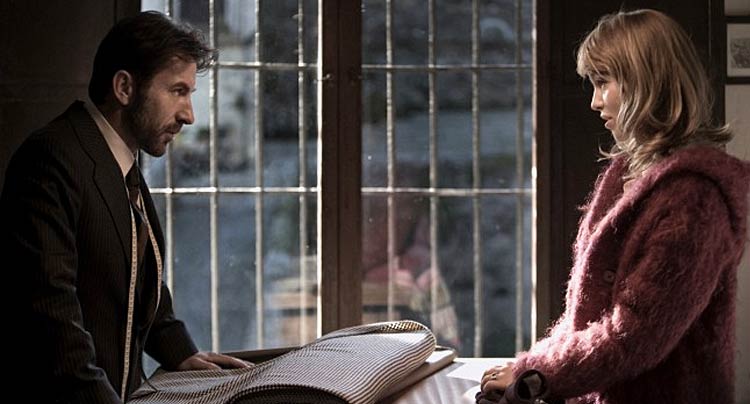
Flawed and imperfect but occasionally worthy of admiration and appreciation.

Flawed and imperfect but occasionally worthy of admiration and appreciation.
Director Manuel Martín Cuenca’s Cannibal won the 2013 Goya Award (the Spanish equivalent of the Oscars) for best cinematography. It’s not hard to see why. Pau Esteve Birba’s cinematography is eerie and elegant, and it helps set the mood for Cuenca’s dark, unsettling story about a quiet tailor who harbors the secret double life of a man with a taste for human flesh.
Considering its lurid premise, Cannibal is oddly reserved in how it tells its story. The film begins with a striking opening shot, a long, unbroken scene, shot from a distance, of a couple at a gas station at night. It’s a slow and ponderous scene that ends with the point of view of protagonist and titular cannibal Carlos (Antonio de la Torre). The shot is reminiscent of the incredible shot in The Bling Ring when the hapless teen criminals rob Audrina Patridge’s glass, steel cube house as the building’s light emanates out through the nighttime shadows. Like that film, and even more closely aligned with Michael Haneke’s directorial coolness, Cannibal is detached and distant from its subject matter. This makes the film often frustrating, but it also leads to some of its most disturbing moments where the uncertainty and ambiguity leaves us with startling horrors.
Carlos stalks the couple from the gas station and veers their car off the road. From the wreckage, he pulls out only the woman (tellingly, he only eats women), and he proceeds to bring her to a cabin tucked away in the mountains. Gruesome as what takes place is, Cuenca shows restraint in how he films this and later scenes. While it’s implied that Carlos butchers the woman, his actions take place off-screen with only a single rivulet of blood shown to suggest the horrors just out of sight. The film elides the Grand Guignol visions of fiction’s most famous cannibal Hannibal Lector. Instead, Cannibal plays more like psychological horror, placing Carlos under a microscope and asking us to try to understand him.

In its interest in the banality of evil, the film has more than a few things in common with The Vanishing. Much of the film’s first hour is so utterly mundane, showing the details of Carlos’ day-to-day life. At times, this can make it easy to forget that Cannibal is at its core a horror movie that just happens to have a lot of art house rigor. From what we see of Carlos’ life, we come to realize that he leads a solitary, hermit-like existence. This is shaken up by the arrival of new neighbor Alexandra (Olimpia Melinte), a flighty woman who recently moved from Romania. Carlos yearns for her but is too fearful to make a connection. His encounters with Alexandra, needless to say, do not end well.
But this is just the beginning of Carlos’ troubles. Soon after her disappearance, Alexandra’s twin sister Nina (also Melinte, doing some great work delineating the two parts) arrives and starts asking questions. Much as Carlos tries to resist getting drawn in, he ends up slowly insinuating himself into Nina’s life and her investigation. The film never makes it clear whether Carlos does this due to an unexpected second chance opportunity at the previously botched relationship or in hopes of covering up his involvement in the disappearance. Honestly, motivations are thin in the film. While initially this is intriguing and engaging, the opaqueness wears itself thin. Unlike the psychological puzzles of, say, Morvern Callar or Under the Skin — and despite how good de la Torre is at compellingly revealing Carlos’ inner emotional turmoil — Cuenca just doesn’t have enough command of his material for this be consistently tantalizing and rewarding.

At the film’s center is the suggestion of the possibility that the beauty Nina might tame the beast Carlos. This Beauty and the Beast tale has more Jean Cocteau than Walt Disney in it, filled as it is with sinister and Freudian undercurrents (The film begins with the epitaph “IN MEMORY OF MY MOTHER”, and it’s heavily implied that Carlos has some serious mommy issues). The one concrete answer to Carlos’ behavior is his periodic church attendance. Carlos is a deeply repressed individual, especially sexually, and much of this likely stems from his devout Catholic background. Carlos uses murder and cannibalism as a substitution for actual sexual experiences, which he has never actually had. The film hints at Carlos’ actions being a kind of transubstantiation. The consumption of the flesh is tantamount to being able to possess that flesh in a way Carlos is incapable of within the purview of traditional, polite society. Carlos has taken Catholicism’s complicated relationship of conflating guilt and desire and turned it into his whole unsteady mental foundation.
It’s fitting that Carlos’ profession is that of a tailor. He, like the film surrounding him, is buttoned down to seem more substantial and wholly good than he is. Cuenca stretches the film’s premise out beyond what it’s capable of withstanding (even only at nearly two hours it feels its length, and it probably should have been cut down about a half hour shorter). Occasionally this pays off in disquieting scenes that cut through the film’s chilly demeanor. But more often it makes the film feel indulgent and not completely conceived or thought through. Birba’s impressive, alluring surfaces cannot hide that there is too much lacking at heart. If we are, forgive the lame use of the idiom, what we eat, Cannibal is all too human, flawed and imperfect but occasionally worthy of admiration and appreciation.